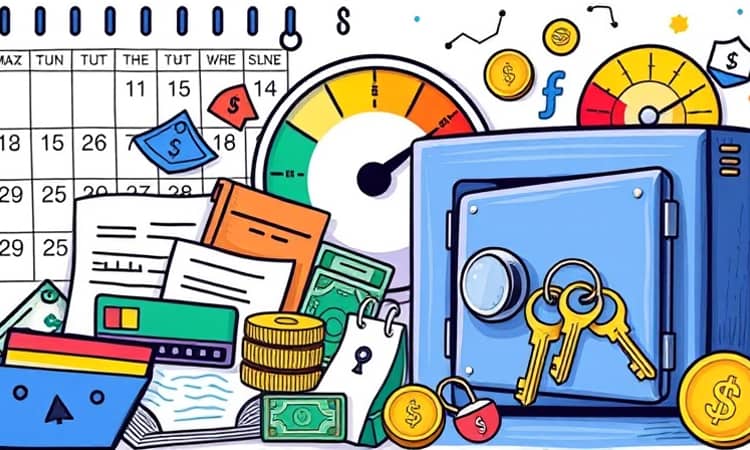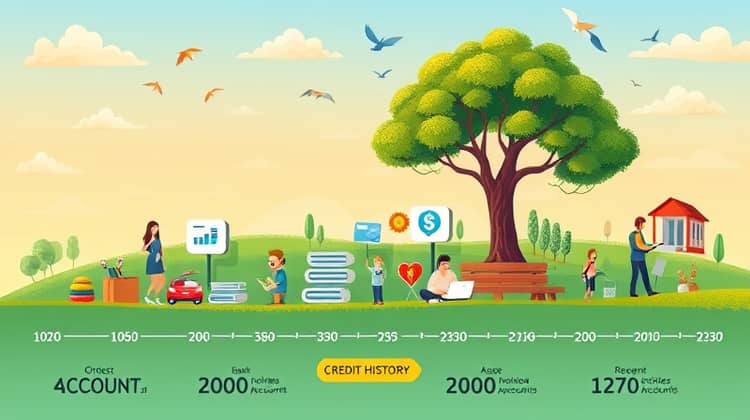Unlocking Your Credit Score: How the Length of Your Credit History Plays a Role

Understanding your credit score is crucial for financial health, as it can determine your eligibility for loans, credit cards, and even housing. Among many factors that contribute to your credit score, the length of your credit history plays a significant role that is often overlooked.
This article will explore the importance of your credit history, the components of credit scoring, and effective strategies to build and maintain a strong credit profile. Let's delve in and unlock the secrets of achieving a stellar credit score.
Understanding Credit Scores

A credit score is a numerical representation of your creditworthiness, which lenders use to evaluate the risk of lending you money. It ranges typically from 300 to 850, with higher scores indicating lower risk for lenders.
Credit scores are influenced by various factors, including your payment history, amounts owed, length of credit history, types of credit in use, and new credit inquiries.
- Credit scores impact loan approvals and interest rates.
- A good credit score can lead to lower premiums on insurance and better financing options.
- Lenders use credit scores to determine the risk of extending credit.
Given that your credit score has such wide-reaching effects, it is important to understand how your credit history contributes to your overall score.
The Components of a Credit Score

The FICO score, one of the most widely used credit scoring models, emphasizes multiple factors to calculate your score. These factors are weighted differently, making some more impactful than others.
For instance, while payment history is the most significant component, making up 35% of your score, the length of your credit history accounts for about 15%. This demonstrates that how long your accounts have been open can significantly affect your credit score.
The Length of Your Credit History

Your credit history length is determined by the age of your oldest account, the average age of all your accounts, and how long it's been since you used these accounts. Generally, a longer history can indicate reliability and stability to lenders.
New borrowers often start with a lower credit score simply because they have a short history. Over time, if you manage your accounts responsibly, your score can grow as your credit history lengthens.
- Oldest account age: The longer the oldest account has been open, the better.
- Average age of accounts: This reflects the overall age of your accounts combined and is crucial for scoring.
- Recent activity: Inactive long-term accounts can potentially decrease your score if not monitored.
Therefore, maintaining older accounts can be beneficial to your credit history length.
Why History Length Matters

The length of your credit history matters because it builds a track record of how well you manage credit over time. Lenders prefer to see evidence of responsible credit use, including timely payments and low credit utilization, over years rather than months.
A lengthy credit history can help mitigate the risk associated with new borrowers, increasing your appeal to lenders and potentially providing you with better rates on loans and credit products.
- Shows consistency in payment behaviors.
- Lends credibility to your creditworthiness assessment.
- Helps in building trust with lenders.
Understanding the weight of your credit history is essential to managing and improving your credit score effectively.
Building a Long Credit History

To build a long credit history, it is advisable to begin using credit as early as possible, even if it's just a small secured credit card. Establishing healthy credit habits right away can pay dividends later in life.
Additionally, keeping accounts open and in good standing for as long as possible will contribute positively to your credit length.
- Avoid closing your oldest accounts, even if they seem unused.
- Regularly check your credit reports for inaccuracies that may affect your credit history.
- Consider becoming an authorized user on someone else’s account to deepen your credit history.
By consciously working to extend the length of your credit history, you can start reaping the rewards in terms of higher credit scores and greater financial opportunities.
The Impact of Closing Accounts

Closing credit accounts can affect the average age of your credit history, ultimately impacting your credit score negatively. When you close an account, that account is no longer factored into the average length calculation, which can lower your score overall.
Moreover, closing an account reduces your available credit, potentially increasing your credit utilization ratio, which further can lower your score.
- Consider keeping accounts open even if you do not use them regularly.
- Evaluate the need to consolidate accounts before deciding to close them.
- Monitor your score after closing accounts.
Hence, maintaining a strategy regarding when to close or keep accounts open can be vital for sustaining a high credit score.
The Length of Credit History and Different Credit Scoring Models

Credit scoring models vary in how they weigh the length of your credit history. The FICO score, for example, gives significant weight to the length of accounts, while other models like VantageScore may prioritize different components.
It's crucial to understand which model a lender uses when you apply for credit, as it can impact the evaluation of your creditworthiness and the decisions they make based on your score.
Other Factors That Affect Your Credit Score

While the length of your credit history is important, there are other critical factors that also affect your credit score. Understanding these factors is essential for managing a healthy credit profile.
These can include your payment history, credit utilization ratio, types of credit accounts, and recent credit inquiries.
- Payment history: Consistency in making payments on time is the most significant factor.
- Credit utilization: Keeping it below 30% of your total available credit is recommended.
- Types of credit: A diverse credit mix, including revolving and installment loans, can enhance your score.
Being aware of these factors can assist you in creating a more comprehensive plan to improve and maintain your credit score.
Tips for Improving Your Credit Score

Improving your credit score requires a strategic approach that addresses multiple components of your credit profile. Consistency and diligence in managing credit activity is vital for success.
In addition to maintaining a long credit history, here are some actionable tips to help improve your credit score.
- Pay your bills on time to protect your payment history.
- Keep credit utilization low—aim for under 30%.
- Request a credit limit increase instead of adding new accounts.
Implementing these actions can help bolster your credit score over time, making you more appealing to lenders.
Conclusion

In conclusion, the length of your credit history undeniably plays a vital role in your overall credit score. Understanding the significance of maintaining a long credit history can help you establish a solid financial foundation.
By employing effective strategies for managing your credit accounts and making informed decisions, you can build an impressive credit profile that serves you well for years to come.






